AAPRS Vietnam veterans denied recognition

A small group of Vietnam War veteran specialist officers and NCOs are being denied an award for their service that is being freely handed out to their modern counterparts who serve in Iraq or Afghanistan.
CAPTION: Army PR photographer Sergeant Bill Errington and PR officer Lieutenant David Brown prepare for airlift into Phuoc Tuy Province, 1968. AWM file number THU/68/0410/VN – supplied by author.
UPDATE: See important update to this story at the bottom of this post
They are the 34 Public Relations Officers and PR Photographers of the Australian Army Public Relations Service (AAPRS) who recorded and reported the Vietnam War from as early as 1964 until Australia withdrew its forces in 1972. Because AAPRS was so small, many of the officers and NCOs served two 12-month tours of duty in Vietnam. One of them, Warrant Officer Class 2 Bill Cunneen, who also served in Japan, Korea, Malaya and Borneo, served multiple back-to-back tours of duty in Vietnam totaling more than 900 days.
For 18 years they accompanied Australian troops on operations in Vietnam, reporting, recording, and photographing the Australians. Many of their dispatches formed the basis of civilian news agency reporting of the war, and many of their feature articles were published in full in Australian and overseas magazines and periodicals, often with bylines attributable to the military authors. The Australian War Memorial archives hold tens of thousands of their photographs, so many in fact that it has still not completed the task of cataloguing them and posting them on its public information website. The AWM is also the home to hundreds of cine films, black and white footage shot on ancient Bell and Howell cameras complete with typewritten storylines and shotlists, that again tell the story of the Australians at war in Vietnam and provide a priceless historical record.
But today’s Army refuses to recognize the service of these Vietnam veterans as a legitimate reason to award them the Army Combat Badge, while it readily awards it to officers and NCOs in Iraq and Afghanistan for doing substantially the same task as their Vietnam veteran colleagues of the earlier war. It has even awarded the ACB to Navy and Air Force photographers who served in Afghanistan.
The ACB, not to be confused with the Infantry Combat Badge, was introduced in 2005 to recognize the service of non-infantry who supported combat teams on operations. An aggregate of 90 days such support is required and ACB eligibility is retrospective to the Vietnam War.
The support the AAPRS provided to combat teams was many-fold. First was the reportage of Australian Army operations to gain favorable support in the face of increasing political and public opposition to Australia’s involvement in the war. Second was to highlight the successes of the Australians as an aid to unit and troop morale, again at a time of increasing public condemnation of the war. Third, Public Relations Officers escorted accredited civilian war correspondents on operations, providing protection for them and allowing military commanders to concentrate on their combat responsibilities, relieving them of the diversions of looking after civilian media. Other tasks included Public Relations and Public Information advice to combat team commanders, and stories and photographs for publication in the Army’s own newspaper, again as a fillip to unit and troop morale.
The Army has repeatedly rejected applications for the ACB from men of the AAPRS who served in Vietnam and each time the reasons for the rejection varied considerably, even though the applications were strikingly similar. This is an indication of inconsistent policy application.
The latest application, dated 30 April 2019, was from David Brown, who served two 12 month tours of duty in Vietnam from 1968-69 and 1970-71. Brown was awarded the Army’s Unit Citation for Gallantry for his participation in the Battles of Fire Support Bases Coral and Balmoral in May 1968.
His application for the ACB was supported by a detailed list of the more than 300 days he spent providing PR support to combat units on operations in Phouc Tuy Province; a thick file of the original media stories and dispatches he wrote during more than 700 days service in Vietnam; a list of his own photographs posted on the AWM public website, and reference to the hundreds of other photographs and cine footage in the AWM archives that were taken by his accompanying PR photographers; all of which supported the legitimacy of his claim for the ACB. Once his application was lodged with Army, it was further supported by a detailed letter from the current Colonel Commandant of AAPRS, Colonel John Weiland, who provided critical analysis of the application and the strong recommendation that it be approved.
Despite this overwhelming evidence, the application was rejected in a letter from the Army’s Director General Army People Capability, Brigadier W.B. Stothart, on 23 March 2020.
To add insult to injury the letter of rejection was full of demonstrable errors, such as stating that Army Records showed that Brown was posted to “Public Affairs HQ 1st Australian Task Force”, which was not a combat unit, therefore rendering the applicant ineligible. The problem with this statement is that the term “Public Affairs” was not used in the Australian Army until the late 1990s, nearly 20 years after Vietnam. Also Brown was posted to Headquarters Australian Force Vietnam, then assigned to the 1st Australian Task Force where he was on the posted strength of Headquarters Company 1ATF, an entirely different entity to that quoted by Stothart. As such it is impossible for any reference such as that quoted to have existed. It is a fiction.
Further, in rejecting the validity of Brown’s eligibility for the ACB, the letter puts its own construct on his role and responsibilities without any authoritative references to counter his own detailing of his roles and responsibilities. Once again it is a fictional creation written by people who have no firsthand knowledge of Vietnam and who have failed to provide evidence to support their false assertions.
The Army’s refusal to acknowledge the role of the AAPRS in Vietnam is a grave injustice and perpetuates the blatant discrimination between today’s AAPRS men who are awarded the ACB for service in Iraq and Afghanistan, and yesterday’s PR Vietnam veterans who are denied it.
ABOUT THE AUTHOR
David Brown was a journalist on The Canberra Times when he was called-up for National Service in 1966. He was commissioned and served 20 years in the Australian Army Public Relations Service. He did two tours of duty in South Vietnam from 1968-69 and 1970-71, where he was awarded the Unit Citation for Gallantry for his participation in the Battles of Fire Support Bases Coral and Balmoral in May 1968.
He served with Headquarters South East Asia Treaty Organization in Bangkok, Thailand, in 1973, and with the Papua New Guinea Defence Force from 1973 to 1975.
He was a senior officer on the staff of Headquarters Multinational Force and Observers in the Sinai from 1983-1984, and exercised with British and Canadian Defence Forces on several exchange exercises.
He held numerous other postings at Army establishments around Australia and in the Department of Defence. His ultimate posting was as Head of the Australian Army Public Relations Service at Army Off ice, Canberra, with the rank of lieutenant colonel, before he resigned his commission in 1986.
Following a civilian career with several leading Australian financial institutions, he moved to Thailand in 2003, where he lectured in English at several Thai universities. In 2006 he was appointed Director of the Language Institute of the prestigious IRPC Institute of Technology, before his retirement in 2011.
He continues to live in retirement in Thailand.
For Further Information or Supporting Documentation:
David Brown
Lieutenant Colonel (retired)
Email: dwbrown555@yahoo.com
Telephone: 66-8-78306477
.
.
UPDATE: 17 December 2020:
.
.
.

.
.

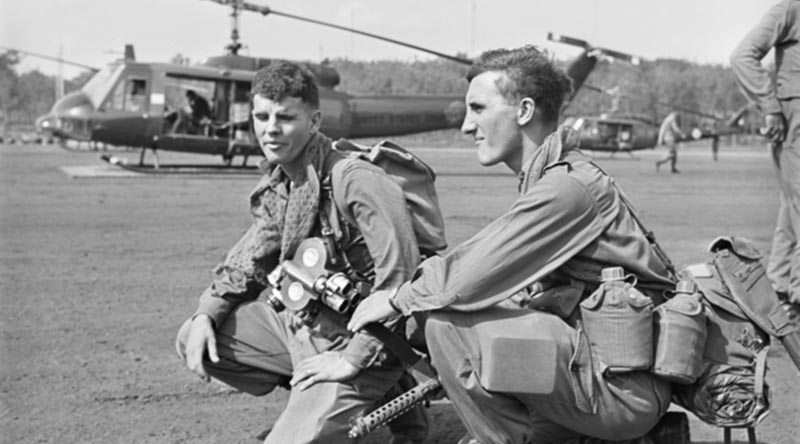
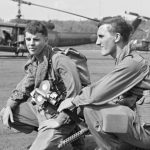
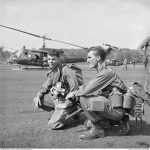

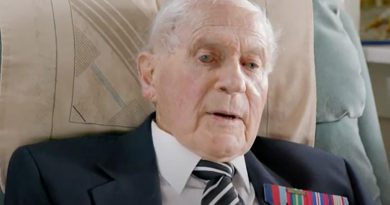
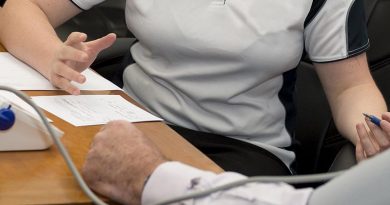
![547 Signal Troop shack at Nui Dat. Image from "The Story of 547 Signal Troop in SVN 1966-1972" by Robert (Bob) Hartley and Barry Hampstead [via AWM web site].](https://www.contactairlandandsea.com/wp-content/uploads/2018/09/547_signal_troop-390x205.jpg)